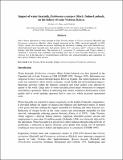| dc.contributor.author | Njiru, M | |
| dc.contributor.author | Othina, AN | |
| dc.contributor.author | Wakwabi, E | |
| dc.date.accessioned | 2015-11-10T11:22:21Z | |
| dc.date.available | 2015-11-10T11:22:21Z | |
| dc.date.issued | 2004 | |
| dc.identifier.citation | Impact of water hyacinth, Eichhornia crassipes (Mart.) Solms-Laubach, on the fishery of Lake Victoria, Kenya. M. Njiru, A. N. Othina , and E. Wakwabi Kenya Marine and Fisheries Research Institute (KMFRI), P O Box 1881 Kisumu kmfkisu@net2000ke.com M. Njiru P O Box 1881 Kisumu, rmnjiru2002@yahoo.com or kmfkisu@net2000ke.com | en_US |
| dc.identifier.uri | http://hdl.handle.net/11671/760 | |
| dc.description.abstract | Due to heavy infestation of water hyacinth in Lake Victoria catches of Clarias gariepinus (Burchell) and
Protopterus aethiopicus (Heckel), which strongly decreased in the 1980s, increased markedly in 1998.
Tilapia catches also recorded an increase following the infestation. Landing areas with sheltered bays,
which harboured more hyacinth mats, had greater catches of C. gariepinus and P. aethiopicus than open
beaches with little hyacinth mats. The increase in C. gariepinus, P. aethiopicus and Tilapia catches is
attributed to increased food availability and breeding areas due to water hyacinth. Reduction of Lates
niloticus (L.) in the lake due to overexploitation could have also reduced predation and competition on
these species leading to their increase | en_US |
| dc.language.iso | en | en_US |
| dc.publisher | Lake Victoria Environmental Management Project (LVEMP) | en_US |
| dc.subject | Lake Victoria | en_US |
| dc.subject | Water hyacinth | en_US |
| dc.subject | Tilapia | en_US |
| dc.subject | Clarias gariepinus | en_US |
| dc.subject | Protopterus aethiopicus | en_US |
| dc.title | Impact of water hyacinth, Eichhornia crassipes (Mart.) Solms-Laubach, on the fishery of Lake Victoria, Kenya | en_US |
| dc.type | Article | en_US |

